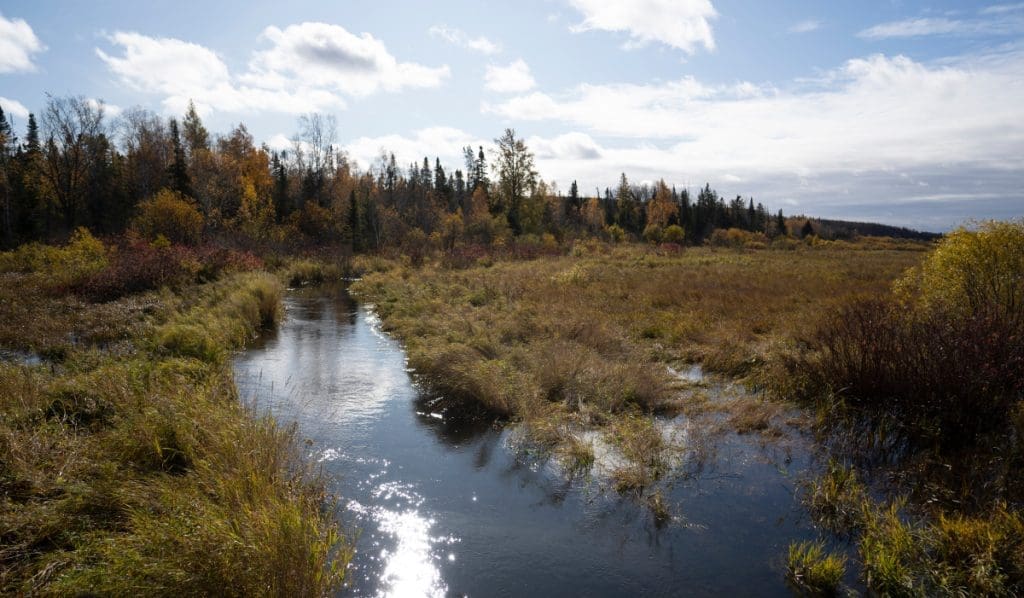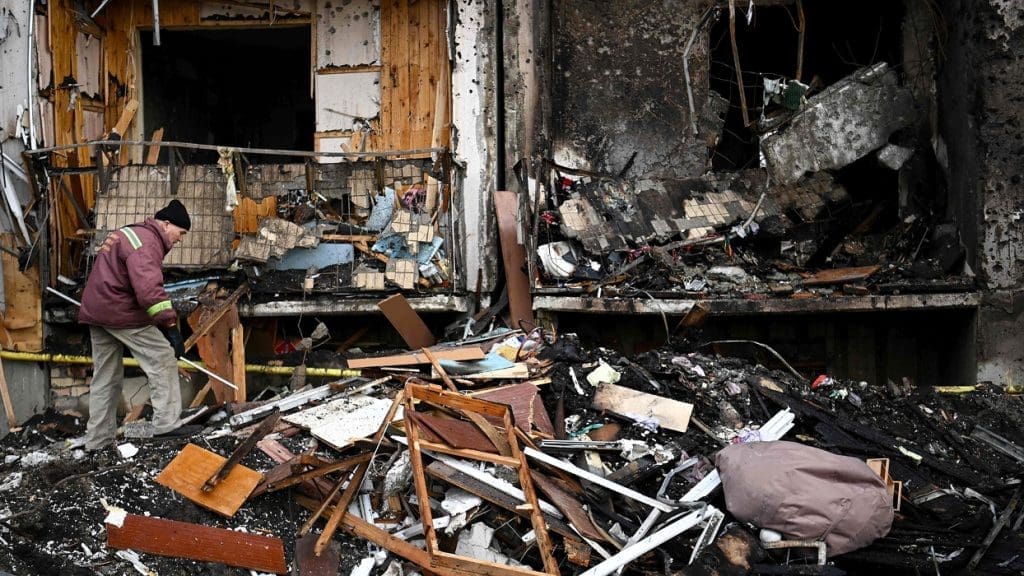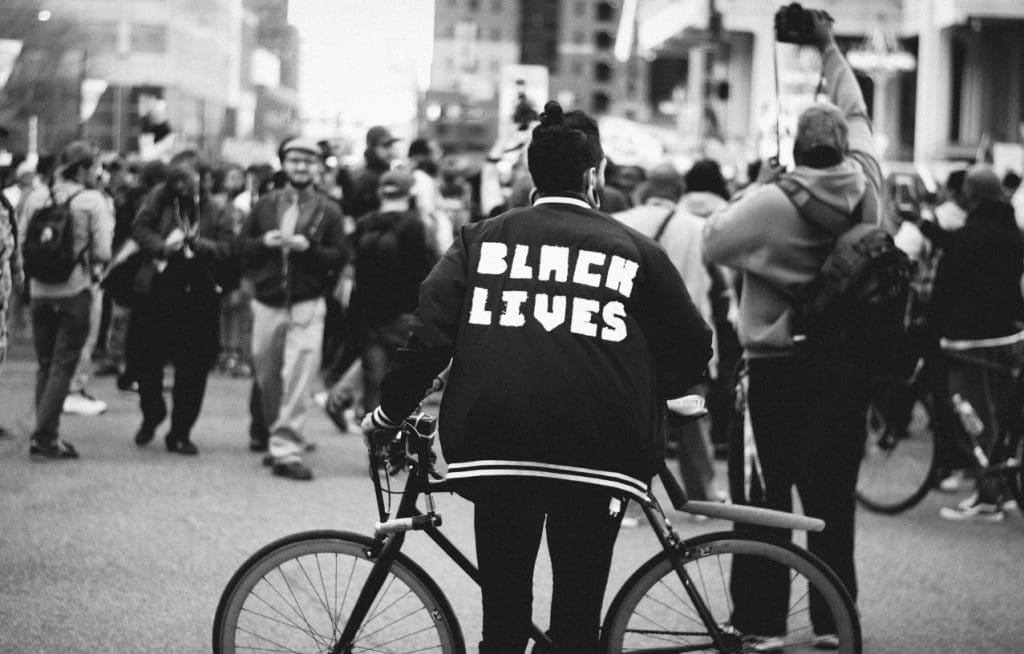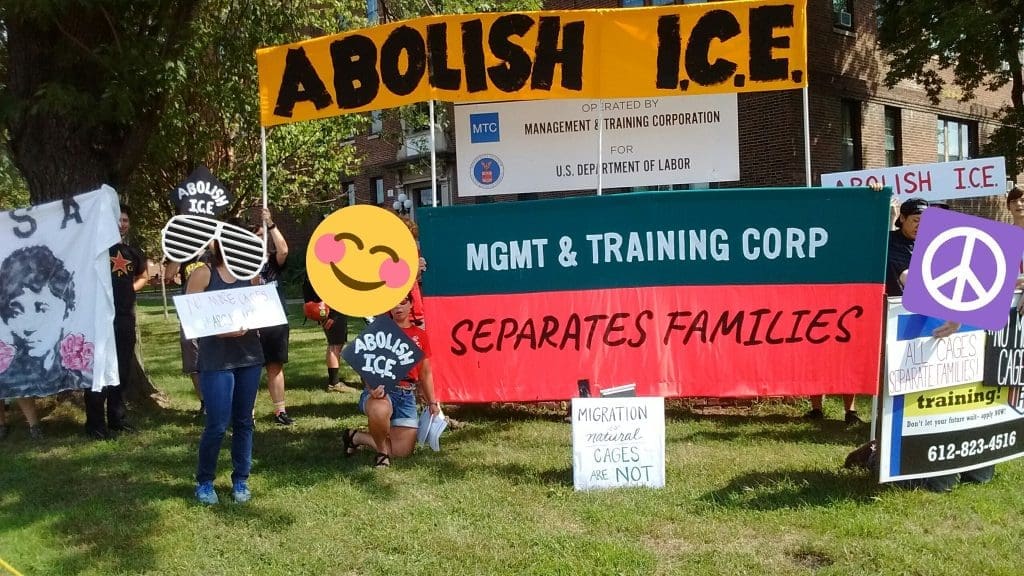Transcribed from the 9 November 2020 episode of This is Hell! Radio (Chicago) and printed with permission. Edited for space and readability. Listen to the whole interview:
It’s not over, the Zapatistas’ exemplary mission of revolutionary organizing: the construction of actual practical alternatives on the ground, reconnecting with land, noting settler colonialism as a structure and as an ongoing event.
Chuck Mertz: Settler colonialism is far from over. It exists every day, its impact and legacy—how it has affected and continues to affect society and culture have been devastating the planet and the people. In order to attain true liberation, that system needs to be challenged. And, as our guest argues, it needs to end if we want to address the many crises we face today and moving forward.
Here to help us rethink things, activist and scholar Mohamed Abdou wrote the ROAR Magazine article “Let Empire Collapse: Why we need a decolonial revolution.”
Welcome to This is Hell!, Mohamed.
Mohamed Abdou: Thank you, I’m grateful to be here.
CM: You write, “I am part of a ‘we’ that says let empire collapse, a ‘we’ that says to build alternatives to empire, we must expose the illegitimacy of the dreadful dream we are in. Instead of trying to shore up or salvage the world as it is, we need to recognize the twentieth century feminist Audre Lorde who said that the master’s tools will never dismantle the master’s house.”
So the master’s tools will never dismantle the master’s house—can empire and settler colonialism be defeated at the ballot box?
MA: No. Absolutely not. That’s a politics of recognition, it’s a politics of reform, it’s Charles Taylor. It’s basic Fanon, Glen Coulthard. Voting is a tactic, it’s not a strategy, ultimately speaking, and so is reactionary street politics. Ultimately, different people—and different contingents of different people, be they Black, be they Indigenous—vote for all kinds of different reasons. It’s not monolithic in any way. Same for people who do not vote whatsoever.
So the question then becomes, as far as I’m concerned: what are social movements up to on the ground? That is the determining horizon, the horizontalist horizon: the possibilities of what’s going on in the streets. As opposed to this recurring ‘Tahrir’ moment. We have to distinguish between protests—which I absolutely support. But given my experience with two revolutions, real revolutions as opposed to the armchair theorization of a scholar-activist: what are the prospects of moving from reactionary street politics, the politics of protest, to learning and building on lessons from Black Power and Red Power movements?
And which alternatives are being engaged? Are we actually constructing alternatives, grassroots alternatives? Free clinics, free schools, and so on? Again, I don’t mean to demean the performative or symbolic importance of protest politics—they provide a moment of opportunity for coalescence, coalescence around solidarity, around allyship discussions to be engaged on liberatory and emancipatory horizons, particularly for BIPOC folks.
If that’s not seized, it becomes another Tahrir moment, another uprising, another Occupy. The Zapatistas paved the way for that twenty-five years ago—it’s not over, the exemplary mission of revolutionary organizing: the construction of alternatives, actual practical alternatives on the ground, reconnecting with land, noting settler colonialism as a structure and as an ongoing event.
Settler colonialism is also a religious structure, mind you: it’s a crusading protestant structure that started in 1492—very much coinciding with the fall of Grenada. Muslims were exposed to at least three Crusades prior to that. So what’s the significance of the connection between that, on a transnational level, and what happened here in 1492?
Settler colonialism is a project that engages an ongoing genocide, not genocide that happened in the past. It is also an ongoing afterlife to slavery, as Saidiya Hartman and many Indigenous and Black and Afro-Indigenous scholars such as Tiffany Lethabo King have noted, very admirably. So unless there are alternatives, an intellectual coalescence of the need for addressing political theology, political liberation, political spirituality, however you wish to frame it—we are in a spiritual war just as much as we are in a cultural war, one that BIPOC folks have been born into, even before we come to realize or fathom our position or the implication of our privileges and penalties within this war.
And it’s a circular war, one that operates between settler colonialism and so-called post-colonial societies that never really decolonized. That becomes the question. Is voting sufficient? Is getting the first African-American president, Obama; the first Secretary of State, Susan Rice; the first Joint Chief of Staff, Powell; Harris, the first Indian-Black vice president now, a prosecutor cop, a carceral feminist, one who’s been relentless with her attacks on sex workers—is that sufficient? That’s liberal multiculturalism for you. The first, the first, the first.
A big problem with liberal progressive positions is their eliding of settler-colonialism. Again, genocide is not a thing of the past; slavery is not a thing of the past—nor are the modern plantations. We just shift terms. We’re in a war of words and of logic, a struggle over the hearts and minds of those organizing on the ground. Of course these alternatives and this intellectual project would have to be defended, by arms if need be. But again, arms are like anything else: a tactic not a strategy.
CM: You mention that the world has never been decolonized. That’s one of the big blind spots many in the West have: they believe the world has been decolonized, that colonization is a thing of the past. How can that view be overcome?
MA: It’s spanning six hundred years. 1492 is the historical marker of the founding of this Columbian conquistador project that now passes itself as a secular humanist one, despite the fact that we have “In God We Trust” on the one dollar bill, pledging sovereignty towards the crusading protestant state. The very definition of patriarchy is anchored in protestant ethics. So we have to take into consideration that nation-states in general are a huge part of the problem; it’s not just racial capitalism.
Can we engage with the fact that the state is a central part of the problem? Can we begin investing in land-based projects, land-based alternatives? That’s what the Panthers did.
This becomes a juncture and a disagreement—not to get ideological, because I appreciate anarchism: anarchism is however not just a European phenomenon. Most premodern societies, arguably BIPOC particularly, were anarchistic. I can certainly speak for Islam on that matter, definitely. There were Black Muslim “empires,” though they weren’t really empires—they resembled confederacies.
But anyway, to get back to the state: The state functions on the supposed idea that we would drift into chaos, into what they refer to as “anarchy,” in its absence. But the state acts as an interlocutor, a mediator that relies on the lowest common denominator of constituents to get this party or that party or this charismatic individual elected. What if we shift that realm of analysis and begin functioning according to what Richard J. F. Day, my former supervisor, had noted is a logic of affinity? The problem with Marxism is the metaphysical fetishization of labor as an abstract category removed from racial processes or racial analyses, intersectional queer analyses, feminist analyses—Indigenous and Black scholarship has critiqued this, as well as the capitulation to party politics, vanguardist politics, as if the state could be used as an instrument for emancipation. We have Stalin and Lenin to speak to that, and many other examples.
But what can we learn from the post-Seattle movements? What if we operate according to a politics of affinity? It isn’t just a matter of the branching logic of hegemony, but a matter of us contending with the relationships and the violences that we reenact. Because institutions of state don’t exist outside of us: we fill them up, and we reenact these violences that we were born into every single day in our day-to-day encounters. We can never delineate the violences or the asymmetries of power among us. But we can minimize them, in a certain sense, by embodying a politics of responsibility: taking responsibility, for instance, for being socialized with patriarchal or matriarchal privileges. I have to contend with the possibility that I may fall into or engage in sexist or patriarchal actions. That is a responsibility I take with me to the grave. Somebody who is white, same thing. Without feeding into guilt and shame (that benefits no one), they have to actually take responsibility for their whiteness.
Here I refer to whiteness not only as a phenotype, an epidermis, a color of skin, but rather cultures of whiteness which BIPOC folks also replicate, as Fanon teaches. There are post-colonial elites. We have traitors among us, unfortunately, and not just among the upper echelons of society, but among artists, musicians, people who in this performative world could very much have a role to contribute to liberation. But that’s been whitewashed, unfortunately, as well.
Can we organize according to a logic of affinity? Can we engage with the fact that the state is a central part of the problem? Can we begin investing in land-based projects, land-based alternatives? That’s what the Panthers did. Indigenous people at the radical end of the spectrum, scholars and activists, have argued that every inch of this land has to be rematriated. There is no freeing Palestine without freeing Indigenous and Black people here.
We have to talk about abolition and how it is contingent on the ongoing settler-colonial process, which is very malleable and very dynamic. It is always evolving; it always depends on imperial wars that displace people all over the world. Then it depends on “landed immigrants,” who are of course refugees—all kinds of different stratas of people who are struggling—buying into the fantasy of upward mobility, a fantasy of empire, and migrating without being held to their responsibilities towards the Indigenous land which serves as the true capital for resource extraction within and outside empire.
Again, I’m not somebody to reject solidarity or allyship from white folks, given my definition of whiteness, but white people do not lead decolonization. This is the one thing that we as BIPOC folks, given the mitigated differences that we have among one another, have to lead ourselves. We have a lot of figure out as BIPOC folks, and we have to engage with our responsibilities and our complicities in Indigenous dispossession after the slavery projects and so on. I shudder to think of when Ilhan Omar shows up at a protest and claims—admittedly so, and rightfully so—that this country is founded on genocide and slavery and so on. What is your complicit role, then, as a politician who plays into respectability as a congresswoman now, in this ongoing genocide? Now you are reifying the American Dream; that’s what you uphold as an exemplar of assimilation, of what is possible in America. Well, it can’t be both.
That’s the question. The state is the fundamental crux and we really need to anchor our analyses and our narratives, and think very critically about what the state is and how it functions—particularly a settler state like the United States or Canada. Voting is not a strategy, it is a tactic at best. We saw with Obama: 26,300 bombs in 2016 alone. This was the first African-American president, who was supposed to usher in a post-racial society. Look at what he left us with. Have they closed Guantanamo? In the meantime the Middle East is destroyed in its entirety, the same Middle East where the Tahrir uprisings arose. This is the world we live in unfortunately, and this is America: a settler McDonald-ized Bonny-and-Clyde culture with its psychotic Hollywood sniper and the fetishization of its imperial conquests. That is the allure of the Dream which, as a matter of fact, has always been a nightmare for the rest of the world.
America is not the heart of the world, it is not particularly exceptional. Unfortunately it is hegemonic, and its hegemony does have an effect on the rest of the world. But the question is what are folks within our movements capable of mobilizing, as far as alternatives? Are people going to continue to die, are Black bodies continue to have their necks crushed? And what about Indigenous people, who are constantly left out of the equation? It’s very interesting to compare Canada and the US in that respect. What gets elided? Where does history start?
Power is rhizomatic. It’s not only top-down or bottom-up. It operates in all directions. Fascism operates in all directions. Where do we learn authoritarianism?
For what constitutes Turtle Island, do we even know what the Indigenous territory is? The place names and how to live on the land? I’m sick and tired of people talking about screw capitalism, screw this and screw that—can you actually devise alternatives to the dominant order that exists? Can you grow your own food? Not only to feed yourself but to feed others around you? What has Bernie Sanders done, truly, in the name of Palestine? He’s a champagne soft-imperialist “socialist,” and I use that term very loosely in his case.
That becomes the issue: the savior/messiah complex, vanguardism, the fetishization of particular individuals and movements, the lack of humility, the lack of an ethics of disagreement on the left (hence Marxists and anarchists tear each other apart). It’s a lack of an ethics of hospitality between spiritual and non-spiritual activists. Religion comes into the equation. What do Islamophobia and antisemitism have to do with anti-Indigenous and anti-Black struggles? Well, we have to sit down and talk about how Indigenous and Black people were depicted as heathens and savages and godless and so on, despite the fact that a fifth to a third of transatlantic slaves were Muslim. It’s a structural project. That’s a story that needs to be told that coalesces from a religious, political, and theological as well as a cultural, gendered, queer, and feminist perspective—everything.
The grassroots, that is the only hope. What can we learn from the post-Seattle movements that decided to invest in building alternatives on the ground? They’re building on the legacy of our elders that should have taught us lessons that unfortunately we haven’t heard. Especially, exceptionally, Tahrir. What’s going on in Sudan, what went on in Syria? Lebanon? Iraq? This isn’t over. Far from it. The question is, what’s going to emerge next?
Our agency is within our own power. Abolition does not demand. It does not request anything. Statues are important to be removed and beheaded—that is a symbolic act, that is an important act. Why aren’t we protesting and burning down the thirteen military bases that are named after Confederate soldiers? Isn’t that a way to stop imperialism, the hyper drone warfare and the NSA surveillance, the matrices of power that we’re caught in, a world in which privacy doesn’t even exist?
These are the questions. Land organizes everything. It organizes our perceptions of gender, our perception of private and public. If there’s still an element of humility within us, it reminds us that we are insignificant and our Earth Mother has her own timetable as far as when and how to revolt. A little bit of humility would do us some good. Our relationship with land is absolutely, dismally broken.
Ironically enough, Trumpism isn’t going to end. Those across the Rust Belt I-4 corridor, blue collar workers and otherwise: ultimately they’re the ones who control the land. They are the ones who control the arms. Where do liberal progressives really conglomerate? They live in the cities. That’s a problem! You can’t really connect with the land in the cities, it’s buying into the urban-metropolis-cosmopolitan-civilizational everything, the phallic existence of highrise towers and so on. There are forms of urban Zapatismo that can be engaged in, but we’re going to need to connect to the land, and that land and this land needs to be repatriated, as every inch of Palestine.
I shudder to think of newcomer Muslims who migrate to Turtle Island and other settler-colonial societies—Australia, New Zealand, and so on—and continue on with their chants and empty rhetoric of Free Free Palestine without actually holding themselves accountable. If they ignore their complicities insofar as Indigenous and Black struggles, they are no different than Zionists on native Palestine.
CM: I came across an article from 2015 that is circulating again on social media, I remember when it came out initially. It’s from a website called Burning Spear, which calls itself “the official organ of the African Peoples Socialist Party.” The article, entitled “Colonialism Trumps Fascism in US Elections,” argues, “The tendency to compare our situation with fascism in Nazi Germany and elsewhere is erroneous, and outrageous when considering the murder, terror, torture, and exploitation that Africans have endured at the hands of our white, ‘democratic’ colonizers for the past six hundred years. A stand that fears Trump fails to recognize that when Africans in the US were subjected to public mass lynchings, that terror was carried out by non-fascist ‘democratic’ states and ordinary white citizens.”
Do you think the current fear of fascism is a distraction from a history of settler colonialism? Is that a purposeful, ignoring our history of settler colonialism to demonize something else that is not the real major problem with our country?
MA: Thank you for raising this point, because it is very important. Again, the crisis is one of language. Fascism is a mass psychology. William Reich, who was a Nazi, wrote a book entitled The Mass Psychology of Fascism. Hannah Arendt wrote The Origins of Totalitarianism. Trump is striving to be a totalitarian. The system itself is fascist.
Where do we learn to become authoritarian? Where do we learn to attack each other, govern one another? Power is rhizomatic. It’s not only top-down or bottom-up. It operates in all directions. Fascism operates in all directions. Where do we learn authoritarianism? It is vis-á-vis the symbolic father that we all have: the state. Of course, capitalism is also authoritarian. Its main function as an Oedipal symbolic mother, if you will, with us as Oedipal subjects, is to materialize, commodify everything: love, friendship, queer pride.
We’re all fascists. When I describe my own complicity in patriarchy, that is a micro-fascism. That is something that I have to contend with. We’re all fascists. The issue is how to deal with the macro-fascistic structure that reifies these micro-fascisms, operating in all directions across all strata, at the institutional as well as the more horizontal level, so as to not reify an oppression Olympics or competition among our struggles.
Trump is striving to be an authoritarian. The system itself is fascist, and that’s a whole different operative mode. We’ve got to recognize the hollowing out of words, and the importance of distinguishing both the connections and divergences between totalitarianism and fascism.
I am not speaking strictly as a Muslim anarchist. Let us look at what radical Indigenous scholarship and movements, Black radical traditions, and abolitionist traditions historically have been saying and continue to say. They seem to say fundamentally one and the same thing on how emancipation is to be achieved.
There are a lot of regimes within the Middle East (and I don’t have to name names) that are totalitarian—from a military perspective, a “secular” perspective, or a religious orthodox perspective. Fascism is a mass psychology. We all reenact fascistic tendencies. You see it within activist circles: the guilting, the shaming, the learning curve that’s involved, the assumptions that are imbued, superficial and otherwise. Think of blood quantum, what “passes” for Indigenous, what “passes” for Black or for Arabs (as though there are no Black Arabs). Think of the conflation of discourses: “Arabs are no different that white people, they engaged in transatlantic slavery too!”
Fascism is what permits these benign, menial, easy, surface level, ahistorical comments. We know there wasn’t a construction of race until white supremacists and white liberals of the Enlightenment project constructed it. White supremacy emerged from liberalism before the modern right wing managed to reserve it—before we saw it in the Klan and so on. The Enlightenment and liberalism was racial capitalist project.
Fascism is a mass psychology. It isn’t something that conglomerates strictly on the right wing. The right wing and Trump are striving to be totalitarian in their outlook, and that’s a whole different level of hegemony, but the system is already fascist.
CM: You write, “From its origins, the trajectory of voting in liberal, progressive, and even some leftist movements is based on several deeply flawed assumptions in this war on Black, Indigenous, and People of Color [BIPOC] communities.”
The first flawed assumption is that the American Dream and democracy exist. But isn’t the American Dream a dream of equality, of egalitarianism? And if so, what explains antagonism toward equality yet support for the American Dream? What explains that contradiction?
MA: It’s a brilliant question. Again, having learned from BIPOC elders (and my shortcomings are my own): “Our children are derived from immortality and are the arrows that we shoot towards infinity.” That’s Mumia Abu Jamal. Mumia Abu Jamal, as Leonard Peltier, are political prisoners. When we’re talking about the American Dream: is genocide over? Are the slavery projects over? That becomes the question. America has an ongoing genocidal past, present, and future. It’s homicidal in the present and suicidal as far as the future.
How does democracy exists when it’s made with redlining, racist district re-mapping, voter disenfranchisement, suppression, partisan gerrymandering, dark money ads, and electoral college systems pegged against the popular vote? You tell me if this is the American Dream, with Black bodies still lying on the sidewalk. You tell me why racialized people, let alone Indigenous people, are suffering the way that they are—they don’t even have access to clean water. After six hundred years—years!—are we to wait another six hundred years for the promise, the progress of the American Dream? And at the cost of whose continued, ongoing dispossession?
People within empire, people beyond empire. What has happened in the Middle East and what continues to happen across the world speaks for itself: the devastation that empire is reaping, the chickens coming home to roost. Malcolm was anti-American for that reason. MLK was a staunch anti-imperialist and anti-colonialist for that reason. And before he was assassinated, may he rest in peace, the great MLK became very disillusioned—perhaps that was the precise reason for his assassination—and he spoke honestly about how the promise of that Dream was always a delusion. After six hundred years, ya basta. Enough is enough.
How can we heal? How can we heal the Earth? How can we move forward as a species without, again, neglecting the power dynamics and differentials that exist between us? I don’t have a hope in humanity per se. At the end of the day, those who have led us—our elders, our movements—were a small fringe, and they were despised and resented. They had a great heart, a magnanimous heart, a promising heart, but for a different set of dreams, a different set of principles: anti-imperialist, anti-colonial, and also decolonial.
There’s a huge difference between the post-colonial assumptions and what decolonization actually means. We need to keep the state out of the picture if we are to avoid further cataclysms. That’s on a geopolitical, theoretical level and and also speaking from frontline fieldwork and movement experience. That’s where I’m coming from.
I’m tired of the endless postponement of judgment. We’re living a Kafka novel, postponing the indefinite, because we fear the promise of an imagined different world. We have a poverty of imagination, as BIPOC folks, because we have to constantly refer and capitulate to white Eurocentric frames of reference in order to legitimize our own thoughts, our own possibilities or impossibilities, in order to seem sensible, to tame our supposed savagery. What if we thought outside the box? What if we tore the whole paper and started to paint a different world?
That’s the promise. That’s what I live on. We rely on our ancestors and elders and the legacies that we already have—I don’t need to refer to democratic socialist platforms that preserve the settler colonial state. And I am not speaking strictly as a Muslim anarchist. let us look at what radical Indigenous scholarship and movements, Black radical traditions, and abolitionist traditions historically have been saying and continue to say. They seem to say fundamentally one and the same thing on how emancipation is to be achieved. Land is important for Indigenous people, its rematriation is spiritual to them and not simply about social justice. This is also about political governance for them, because sorry, the state is antithetical to Indigenous understandings of sovereignty and nationhood.
Are we going to take Indigenous people seriously or are we just going to play pretend, play performative “woke” politics? Where are Indigenous people now, given six hundred years of religious projects like the Doctrine of Discovery and Manifest Destiny? Where are Black people now? Are they not still shackled? The ship and the wake still exist, to use Christina Sharpe’s metaphor of the wake, the awakening work. We have to appreciate the shoal, in Tiffany Lethabo King’s work: the congruence and confluence of Indigenous and Black struggles—and, I would argue, Muslim struggles—and the plethora of unruly and unruled meanings that are associated with Blackness and Indigenous and otherwise.
So I don’t know. It was always a false dream. And it never will be real.
CM: Mohamed, I can’t thank you enough for being on the show this week.
MA: It is my honor, I am humbled.
Featured image: near the Mississippi headwaters, an ancient source of life in peril





